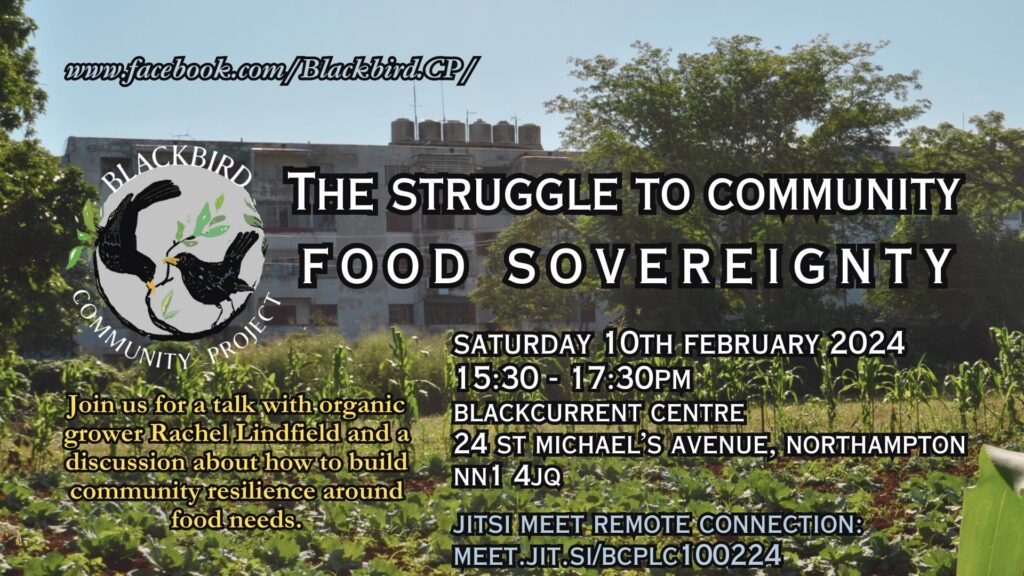
“There is a gap between small Market Gardens and massive monocultural farms. We need in betweens.“
3:30pm, Saturday 10th February 2024
Blackcurrent Centre, 24 St Michael’s Avenue, NN1 4JQ
Key terms:
- Agro-ecology – sustainable farming. See also Organic Farming, Permaculture, Regenerative Agriculture
- Annuals, Annual crops – a plant with a life cycle of one growing season, unlike Perennials
- Collapse – the breaking down of the systems that currently sustain life, including political systems and ecological systems
- Community Supported Agriculture (CSA) – a structure where community members buy into a farm to pay its running costs, and in turn receive foods grown by the farm
- Market Garden – a small-scale farm selling directly to customers and local businesses
- Monoculture Farming – the farming method of growing one crop in one place at a time, as opposed to ecologically self-supporting approaches such as Agro-ecology, Organic Farming, Permaculture, Regenerative Agriculture.
- Non Dualism – the idea that all life is connected
- Organic Farming – farming that doesn’t use pesticides, fertilisers, or genetic modification, but using ecological principles for farming. See also Agro-ecology, Permaculture, Regenerative Agriculture
- Perennials, Perennial crops – plants that don’t need to be replanted each year, unlike Annuals
- Permaculture – an approach to designing food-growing and ecological land that considers the needs of all the different species already living in a space, as a way of growing a bio-diverse space that does not require a lot of human intervention over time. See also Agro-ecology, Organic Farming, Regenerative Agriculture.
- Regenerative Agriculture – a way of farming that improves ecological health. See also Agro-ecology, Permaculture, Organic Farming.
- Social Ecology – the idea that fighting ecocide will be unsuccessful unless we also exploitation etc.
- Supply Chain – the journey an item goes through from where it is produced to where it gets sold to consumers, with a start and end point. In today’s world, Supply Chains usually rely on poorly paid and badly treated workers to provide for rich parts of the world. As opposed to a Supply Web.
- Supply Web – A network that fairly and responsibly shares materials for production and consumption from many places to many other places, as opposed to a linear Supply Chain.
Rachel is a veg grower in North Oxfordshire at a North Aston Organics, a 12-acre organic farm.
In 2020, many people reacted badly to the pandemic (such as by panic buying), Rachel took this as a warning for future crises. This led to her looking into the need for community resilience.
Studying how change happens, you learn how little has been achieved through just protest & lobbying alone. For over 50 years, large numbers of people have sunk lots of energy into trying to make change from inside the system, yet there’s nothing to show for it.
Rachel joined community gardens in North London, and realised this was a way to directly help our collective survivability.
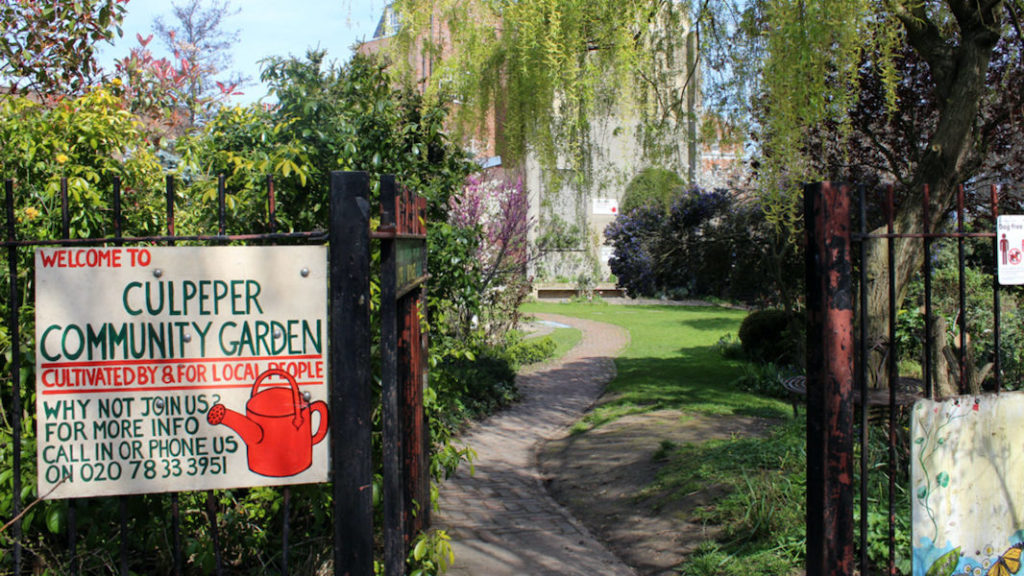
Conventional farming methods have caused a lot of harm to the environment, and they have limited people’s understanding of what is needed in order to feed everyone.
Agro-ecology is dealing with our food needs while respecting the needs of the environment.
It is a form of Regenerative Agriculture which focuses on longterm sustainability, ecological health, and biodiversity.
A movement is building around communities’ involvement with food, agriculture, and ecological stability.
Land Workers’ Alliance (LWA) – website
- union of growers and land workers
- began in 2012
- now about 35 employees
- represents small farmers in workplace disputes
- enables networking between small growers
LWA shows that a lot more of the world is fed by small scale, and somewhat organic farms than we think.
‘A Small Farm Future’ book by Chris Smaje. Says that a large number of people would have to take on agricultural labour in places like Britain where we currently depend on international imports. But it is achievable with intelligent ways sharing out the work that needs to be done, and would involve less work overall than the current types of agriculture. Examples are cooperative housing with land, Community Supported Agriculture schemes.
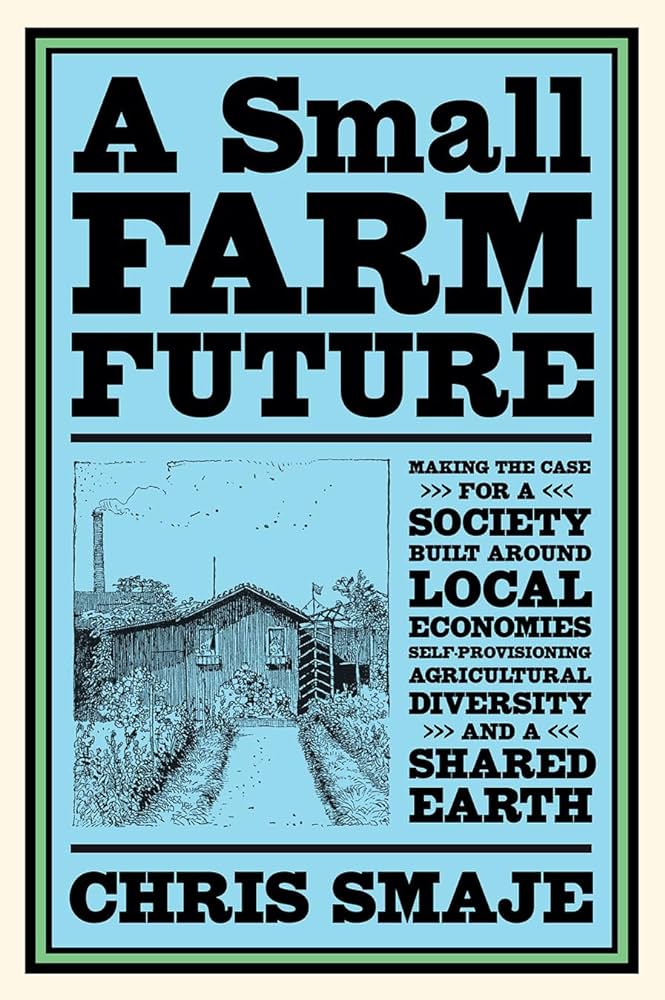
‘Can Britain Feed Itself?’ article from The Land magazine worked out that there is more than enough arable land on the British isles feed the whole population without exploiting animals or destroying the environment.
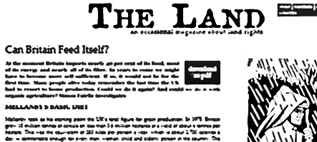
‘Braiding Sweet Grass’ book by Robin Wall Kimmerer talks about how all farming involves weighing up the pros and cons of each practice.
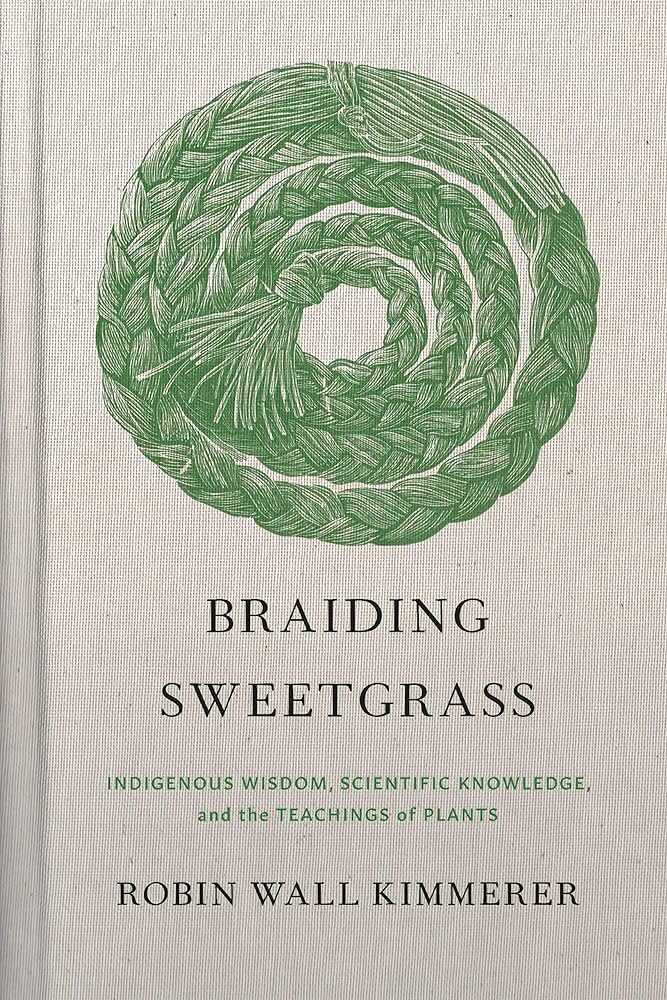
Non dualism – oneness of all life
Social Ecology – The idea that we can’t properly fight for the environment without also fighting against other kinds of exploitation, like the exploitation of the working class.
Much more energy is required to grow annual crops, so perennials & agroforestry are more manageable for growers, and more self-sustainable for the local environment.
It is not much more effort to grow 1 acre of veg than it is to grow 1/2 an acre, but an acre produces a lot more veg!
For resilience, don’t water plants too often, they are hardier than we tend to think. Many people coddle plants, but if you don’t water too often, the roots are encouraged to grow deeper. North Aston waters most crops once every two weeks.
Right To Roam (RTR) – website
UK is one of many countries that have not had movements to take land back from big owners. RTR challenges the unchecked control of huge amounts of land by super-rich owners.
Ecological Land Co-operative – website
Buys land for small scale ecologically sustainable agriculture, with longterm tenancies (up to around 100 years).
If we want to manage as ecological conditions get worse, we need to shift our dependence from ‘supply chains’ to supply webs, which are more mutual relationships. Conventionally, food or materials are controlled by the ‘owner’ in between where it comes from and where it needs to go. But a Supply Web is, like a Circular Economy, a structure where each part is feeding into another, and working together instead of competing.

A community of people can more efficiently, less labour intensively, and more cheaply meet each others’ needs than each of us ourselves alone.
Incredible Edibles, Todmorden, W’ Yorks, England – website
A community group that grows edible plants in public spaces around the town which anybody can pick as they like. They advocate sustainable growing.
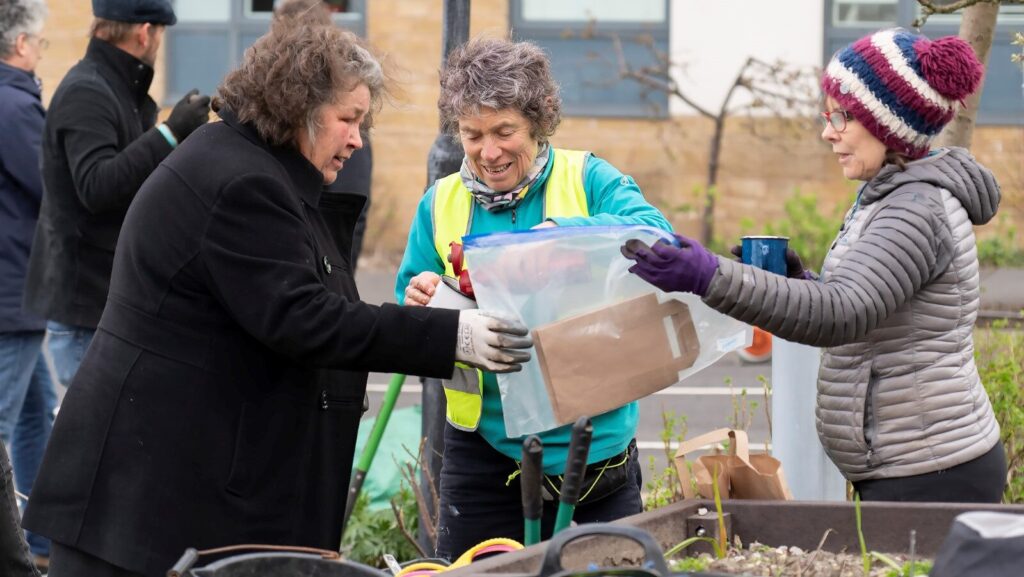
There is a gap between very small Market Gardens and massive scale monocultural farms. We need in betweens. These can take the form of public planters, community gardens (with a small handful of people who dedicate the most time, and many others who can join occasionally), community-supported agriculture etc.
An upside of these projects is that they give regular people the responsibility over the space and access unlike most outdoor spaces. They can be used more flexibly, and group ownership opens up new ways of using space.
Q: In Northampton we already have a few green groups that are open for new people to join, but they are established in a way that people who might be interested either wont find them or dont feel strongly about getting involved. How do you think we can try to bridge the gap between existing spaces and people who might get a lot from them?
A: Consistency is key. We have to pay attention to what does and doesn’t bring people in. There’s a common barrier when it comes to sharing responsibility for a project; in order for anybody to take ownership, they need to see their own ideas being made real by the people around them. But this can only be done by building relationships over time and letting the conversation carry on. So, essentially, we have to keep going, find out what makes people come back, and make it enjoyable for those who are running so it can keep running consistently.
North Aston Organics host a farm walk in July – Blackbird people would like to visit! It’s less than an hour’s drive from NN1, we could pool cash for transport.
Note for Learning Circle group:
This was the widest advertised Learning Circle event so far but the least attended. The first two were each cosigned by other already established organisations, South Court Environmental (local) and Solidarity Economy Association (online).
BCP organisers have an idea about trying to form relationships with existing orgs and venues with similar values so they will help promote these events, and we will give them something in return.
